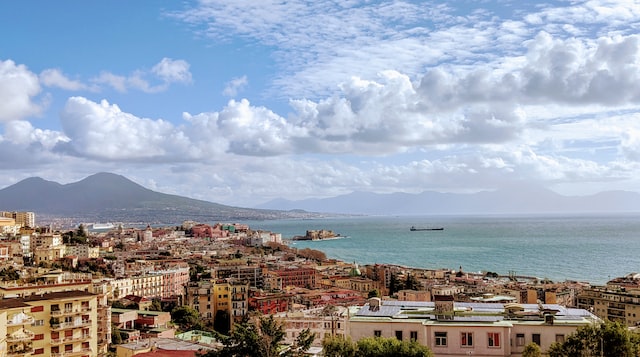
Napoli, or Naples for English speakers, is my favourite city. It’s a city of stark contrasts – glorious architecture competing with multi-layered graffiti, hidden piazze surrounded by piled-up rubbish.
Naples might be the only place where, late in the evening, you can see a group of nuns carrying takeaway pizza back to their convent. It is, after all, the city where the pizza was invented. It has been reviled for its mafia clans while being deeply steeped in age-old superstitions, with polished skulls in countless crypts.
It is also the place where, twice a year, the entire population prays that its patron saint San Gennaro’s blood will liquefy as a portent of good luck.
Here are five novels that really bring this wonderful city to life:
1. My Brilliant Friend by Elena Ferrante
There is no better place for a late afternoon aperitivo than the Piazza San Domenico Maggiore in the heart of the historic centre to soak up the atmosphere of this vivacious city, and no better novel to get a flavour of it than Elena Ferrante’s My Brilliant Friend (2012). Following childhood friends Lenù and Lila through their troubled teenage years into adulthood, this book wonderfully conveys the spirit of Napoli.
Ferrante masterfully conjures up images of this colourful city as we follow her characters along to the Piazza Carlo III, the Albergo dei Poveri, the botanical garden, Via Foria and Port’Alba. For anybody already familiar with Napoli, these are well-known landmarks; for those new to the city they serve as a good starting point for a mid-morning passeggiata (a leisurely stroll) that should always end with a lunch time slice of pizza. When in Napoli, do as the Neapolitans do.
2. Blood Curse by Maurizio De Giovanni
Maurizio De Giovanni’s Commissario Ricciardi series is set in Fascist era Napoli, between 1922 and 1943. Ricciardi solves murders aided by his peculiar visions – he can see the last seconds of a murder victim’s life – and his insatiable appetite for sfogliatelle, a sweet pastry originating in the Campania region.
His novels are full of atmospheric detail, like this passage from Blood Curse:
The Vico del Fico was a blind alley, an inset halfway up one of the steep streets of the Spanish Quarter. At the entrance to the alley was a shrine to Our Lady of the Assumption … then there was a little piazzetta, invisible from the street: five bassi teeming with life.
They are gritty and violent but convey a real sense of a city where passions run high and loyalties cannot be betrayed.
3. Naples’44 by Norman Lewis
Similar impressions of Naples were made by the British Intelligence Officer Norman Lewis while he was stationed in Napoli during the second world war. His military memoir Naples’44 (1978) conjures up images of coffee at the Gran’ Caffè Gambrinus on Piazza Plebiscito, or meals at Zi’ Teresa’s in the shadow of Castell d’Ovo. It is a testament to his affection for this city of contrasts: a lament for the poverty and corruption he encounters but simultaneously a love letter to the beauty that captivated him.
4. Falling Palace: A Romance of Naples by Dan Hofstadter
Written in 2006, this book is an evocative account of Hofstadter’s time spent in Napoli as he followed his Italian girlfriend. Hofstadter beautifully depicts this city of contrasts as he tries to settle there. The book recounts living in a traditional basso (a typical Neopolitan ground-floor flat) and befriending many local characters, like the owners of the many curio shops, the typical Neapolitan lottery vendor and the men carving traditional Nativity scenes.
Just as De Giovanni, much of Hofstadter’s account is focused on the Quartieri Spagnoli (Spanish Quarter) whose “reputation for violence, caused by rival Camorra clans” was well known to him but where he “never felt menaced in the streets”.
He too conjures up the overcrowded bassi where, passing “their wide-open doors or windows”, he would “glimpse intimate yet completely unself-conscious scenes: tired housewives fanning themselves under pictures of Padre Pio; muscular youngbloods shining up their Vespas next to their beds; groups of girls sewing or basting skirts or dresses”. For Hofstadter, like so many other writers, it is the very contradiction of Napoli – beauty vs dereliction, sweet domesticity vs crime – that makes this city so captivating.
5. Gomorrah by Roberto Saviano
No list of books about Napoli would be complete without Gomorrah, which delves straight into its dark heart. Also written in 2006, the book depicts Saviano’s infiltration of local Camorra clans and their dominance over local businesses and industry.
Gomorrah, which has been adapted into a film and a successful TV series (2014-2021), is a brutal and discomforting read. The book shows just how much crime infiltrates daily life in Napoli.
Nevertheless, I would hazard that Saviano’s motivation for this book was his deep love for his home city and his one-man crusade to rid it of the crime that has plagued it for so long.
Reader in Literature, University of Portsmouth
Disclosure statement
Christine Berberich does not work for, consult, own shares in or receive funding from any company or organisation that would benefit from this article, and has disclosed no relevant affiliations beyond their academic appointment.
This post was originally published at The Conversation.



